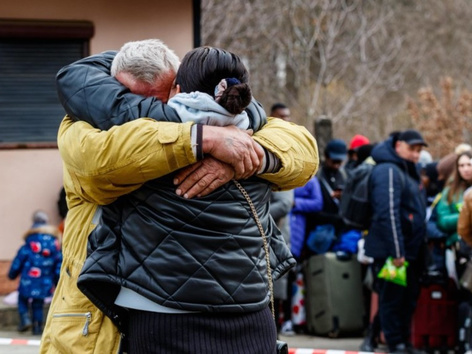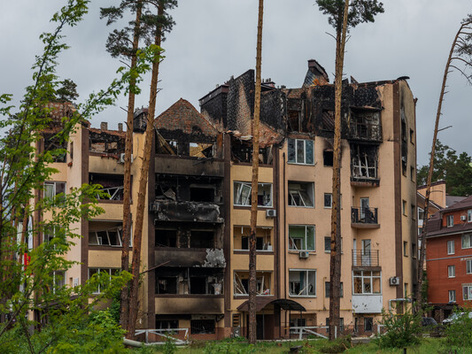Inhaltsübersicht

The war deals a devastating blow to Ukraine's demography. According to the State Border Service, about 4.8 million citizens have left Ukraine since the beginning of the full-scale invasion. A significant part of the refugees who are in the EU countries plans to return home in the near future. However, there is a part of Ukrainians who are going to settle in neighboring countries forever. There are various reasons for this: from the lost home to the desire to live in safer countries away from the aggressor country.
Director of the Institute of Demography and Social Research of the National Academy of Sciences of Ukraine Ella Libanova spoke in an interview with Economic Pravda about the effects of hostilities on migration processes.
Living in Europe
Most of the European countries to which Ukrainians were forced to leave have introduced special social programs for refugees. Poland, the Czech Republic, Italy, and other EU countries offer financial assistance, health insurance, and other benefits for refugee status. Since the majority of refugees are women with children, the states of temporary residence help with placement in kindergartens and educational institutions. In most cases, employment takes place according to a simplified procedure, and housing is provided by the highest state bodies.
Against the background of active hostilities in Ukraine, for many refugees, temporary residence in Europe after adaptation may turn into a permanent residence.
According to Libanova, there is a high probability that after the end of the war, families will be reunited on the territory of the EU, and not in Ukraine.
How many refugees will return to Ukraine?
As the scientist notes, this number directly depends on the terms of the end of the war. The longer the hostilities continue, the more Ukrainians will settle abroad.
"If the hot phase of the war ends relatively quickly, the irreversible migration will amount to 500-600 thousand people. If the war drags on, especially its hot phase, many people will move to Germany, Italy, the US, Australia. Then the irreversible migration may reach five million," Libanova said.
Demographic catastrophe in Ukraine
Considering the demographic crisis that has been observed in Ukraine in recent years, the war will only worsen the situation. Ukraine has one of the lowest birth rates in the world, and the population has decreased by 10 million over the past 30 years.
According to the results of the study, in the conditions of war, only 42.9% of Ukrainians are ready to plan the future for their children and grandchildren in Ukraine. This means an inevitable decrease in population growth. According to Libanova, the vast majority of children today are born as planned, so birth rate growth can only be expected if the situation stabilizes and the standard of living improves.
The migration wave of refugees, whose average age is 36, will also affect the age structure of the population. Since able-bodied citizens with children leave Ukraine, the "aging" of the population may cause a labor shortage and make the process of natural reproduction of the population impossible.
Competition for able-bodied Ukrainians with the EU
In the EU countries, the number of citizens who have received migrant status is growing every year. According to Eurostat, in 2017 this figure reached 905,000, and in 2019 – 1,198,000. Due to the war in Ukraine, the number of migrants in the EU is expected to increase significantly.
According to the migrant attraction program, EU countries are interested in qualified personnel who have higher education and are ready to master new skills. As Libanova noted, 76% of Ukrainian refugees in Poland have higher education, so Ukraine will have to compete with EU countries for able-bodied citizens and their children. She believes that the Ukrainian government should actively maintain contact with refugees abroad, while EU countries will try to adapt Ukrainians to migrant work as soon as possible.
What steps will the state take to help return Ukrainians home?
According to the scientist, the availability of housing and stable work will directly affect people's desire to return home. During the war, she recommends that Ukrainian businesses provide the opportunity for refugees to work remotely, and for children to study online. These connections and state support will help Ukrainians to return to their homes.
According to First Deputy Minister of Economy Denys Kudin, the government considers its main task to return as many people as possible to Ukraine by September 1. Therefore, the state has already started work on solving housing and employment issues.
The difficult issue of rebuilding the country and providing housing to those Ukrainians who lost their homes is already being considered in the relevant draft law. The solution is to compensate Ukrainians.
As for jobs, the Ministry of Economy has already developed a program to stimulate entrepreneurial activity, which provides for the issuance of grants of up to UAH 250,000 to stimulate business opening.
Ella Libanova added that internal migration within the borders of Ukraine will have a very good effect on the political transformation of the Ukrainian nation: "There will be a mix-up, we will stop thinking that the residents of Zaporizhzhia are somehow fundamentally different from the Ivano-Frankivsk region. That's why it's very good, but that's the only positive thing about it," she noted.
Avoiding the demographic crisis is possible under the condition of a quick end to the war and a set of government actions that should support citizens, regardless of their location.
Recommended articles
2 min
Veranstaltungen
2 min
Krieg
1 min
Für Flüchtlinge


